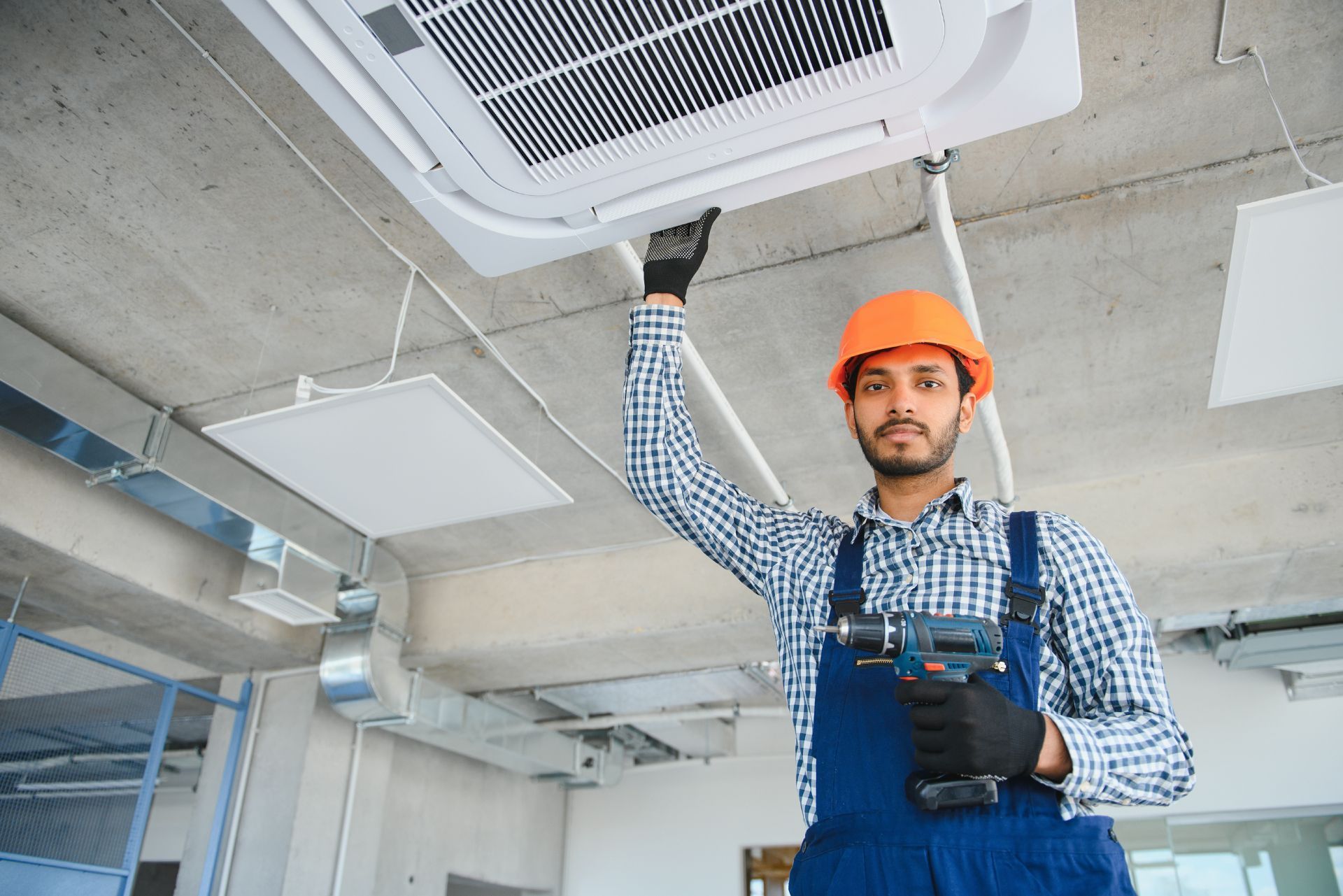Top 3 Recommended Policies

Virginia’s HVAC contractors serve a diverse range of customers, from coastal homes along the Chesapeake Bay to mountain properties in the west. Each job brings its own challenges, and every project carries the risk of property damage, equipment failure, or workplace injuries. Having the right insurance coverage is essential to protect your business, your employees, and your reputation. This guide breaks down HVAC contractor insurance in Virginia, outlining the most important coverage types, average costs, and current market trends. Whether you manage a small local crew or operate a larger company, understanding your insurance options will help you stay compliant, minimize risk, and keep your business running smoothly in a competitive market.
Understanding the Importance of HVAC Contractor Insurance in Virginia
HVAC contractor insurance is a specialized form of commercial insurance designed to protect businesses from a wide range of risks, including property damage, liability claims, and employee injuries. Given the physical nature of HVAC work—installing, repairing, and maintaining complex systems—contractors face potential hazards that can lead to costly lawsuits or operational interruptions.
In Virginia, having the appropriate insurance coverage is crucial for compliance and business continuity. According to Hampton Roads Insurance, these policies help businesses mitigate risks associated with both liability and property perils, ensuring that contractors can focus on delivering quality service without worrying about unforeseen financial setbacks.
Moreover, insurance coverage can enhance a contractor’s credibility with clients. Many homeowners and commercial customers prefer working with insured professionals, knowing that any damages or injuries are covered. This trust factor is increasingly important in a competitive market.
Additionally, HVAC contractor insurance often includes coverage for equipment and tools, which are essential for daily operations. These tools can be expensive, and if they are damaged or stolen, it can lead to significant financial losses and delays in project timelines. By having the right insurance, contractors can ensure that they are able to replace or repair their equipment quickly, minimizing downtime and maintaining their reputation for reliability.
Furthermore, the dynamic nature of the HVAC industry means that regulations and standards are constantly evolving. In Virginia, contractors must stay informed about local laws and safety regulations, which can sometimes change unexpectedly. Insurance providers often offer resources and support to help contractors navigate these complexities, ensuring that they remain compliant and can adapt to new requirements without jeopardizing their business operations. This proactive approach not only protects the contractor but also enhances the safety and satisfaction of their clients.

Types of Insurance Coverage Essential for Virginia HVAC Contractors
General Liability Insurance
General liability insurance is the cornerstone of any HVAC contractor’s insurance portfolio. It covers claims related to bodily injury, property damage, and personal injury caused by the contractor’s operations. For example, if a technician accidentally damages a client’s property while installing a system, this insurance helps cover repair costs or legal fees.
Premiums for HVAC liability insurance in Virginia typically range from 1.3% to 2.6% of annual gross revenue. For smaller operations earning around $150,000 annually, average premiums hover near $3,140 but can be reduced significantly—sometimes to as low as $860—through competitive shopping and tailored policies, according to data from Contractor Nerd. This makes it both a necessary and manageable investment for businesses of all sizes. Additionally, many contractors find that bundling their general liability insurance with other coverage types can lead to further discounts, making it an even more cost-effective solution.
Workers’ Compensation Insurance
Given the physical demands and potential hazards of HVAC work, workers’ compensation insurance is essential. It provides coverage for medical expenses and lost wages if an employee suffers a work-related injury or illness. In Virginia, the typical cost of workers' compensation insurance for HVAC businesses is approximately $2,900 per $100,000 in payroll, as reported by Contractor Nerd.
Experts emphasize that workers’ compensation is not only a legal requirement in many cases but also a critical factor in protecting your workforce and maintaining operational stability. Without it, businesses risk facing expensive lawsuits and employee claims that could jeopardize their financial health (Total Work Comp). Furthermore, having a robust workers’ compensation policy can enhance employee morale and retention, as workers feel more secure knowing they are protected in the event of an accident. This can ultimately lead to a more productive work environment and a stronger reputation in the community.
Commercial Auto Insurance
Many HVAC contractors rely on vehicles to transport equipment and personnel to job sites. Commercial auto insurance covers vehicles used for business purposes, protecting against accidents, theft, and damage. This coverage is necessary to comply with Virginia’s motor vehicle laws and to safeguard your assets. Additionally, it can cover liability for injuries or damages caused by your vehicles, ensuring that your business is protected in the event of an accident.
Moreover, commercial auto insurance can also include coverage for specialized equipment that may be stored in the vehicles, such as tools and HVAC units. This added layer of protection is crucial, as the loss of such equipment can lead to significant delays and financial strain on a contractor's operations. As such, HVAC businesses should carefully assess their vehicle usage and ensure that their commercial auto insurance policy is comprehensive enough to cover all potential risks associated with their operations.
Equipment and Property Insurance
HVAC businesses often invest heavily in tools and equipment. Equipment insurance protects these valuable assets from damage, theft, or loss, while property insurance covers your business premises. Both types of coverage help avoid costly out-of-pocket repairs or replacements that could disrupt business operations.
In addition to protecting physical assets, equipment and property insurance can also provide coverage for business interruption, which is vital in the event of a disaster that forces a temporary shutdown. This type of coverage ensures that contractors can continue to meet their financial obligations, such as payroll and rent, even when they are unable to operate normally. Furthermore, having a detailed inventory of equipment and property can streamline the claims process, making it easier for contractors to recover quickly and efficiently after an incident. This proactive approach not only safeguards the business but also reinforces trust with clients who depend on timely service delivery.
Current Trends and Growth in Virginia’s HVAC Industry
The HVAC industry in Virginia is experiencing steady growth, which directly impacts insurance needs and market dynamics. The Heating & Air-Conditioning Contractors industry is projected to grow at an annualized rate of 1.3%, reaching $3.6 billion in revenue by 2025. Additionally, the number of industry establishments is expected to increase by 1.6% annually, reaching nearly 3,000 locations statewide (IBISWorld).
This growth signals rising demand for HVAC services, which in turn elevates the importance of having robust insurance coverage. As businesses expand, they face greater exposure to risks—making comprehensive insurance policies even more critical. With the increasing complexity of HVAC systems and the integration of smart technology, contractors must ensure they are adequately protected against potential liabilities that could arise from installation errors or equipment failures.
Another notable trend is customer loyalty. A recent survey found that 73% of homeowners in the U.S. choose their HVAC contractor by contacting the same company they’ve used before, marking a 44% increase from the previous year (ACHR News). This highlights the importance of maintaining a trustworthy reputation, which insurance coverage supports by demonstrating professionalism and reliability. Furthermore, as energy efficiency becomes a priority for many homeowners, HVAC companies that offer eco-friendly solutions and energy-efficient systems are likely to see a boost in customer retention and new client acquisition.
In addition to these trends, the HVAC industry in Virginia is also witnessing a significant shift towards digital transformation. Companies are increasingly adopting advanced software solutions for project management, customer relationship management, and service scheduling. This digital shift not only streamlines operations but also enhances customer experience by providing timely updates and efficient service. As contractors embrace technology, they must also consider cybersecurity insurance to protect sensitive customer data, which is becoming an essential aspect of doing business in the modern age.

How to Choose the Right HVAC Insurance Provider in Virginia
Selecting the right insurance provider is as important as choosing the right coverage. Virginia HVAC contractors should look for insurers who understand the specific risks of the industry and offer tailored solutions.
Key factors to consider when choosing a provider include:
- Industry Expertise: The insurer should have a deep understanding of HVAC operations and associated risks.
- Comprehensive Coverage Options: Look for providers offering a full suite of policies, including general liability, workers’ compensation, commercial auto, and equipment insurance.
- Competitive Pricing: Premiums should be reasonable and reflect the size and scope of your business.
- Claims Support: Efficient claims processing and responsive customer service are vital during emergencies.
Additionally, it’s beneficial to research the insurer's reputation within the HVAC community. Seek feedback from fellow contractors about their experiences with different providers. This can provide insights into how claims are handled and the overall customer service experience. Online reviews and testimonials can also be a valuable resource, helping you gauge the reliability and trustworthiness of potential insurers.
Another important aspect to consider is the flexibility of the insurance policies. As your HVAC business grows or changes, your insurance needs may evolve. Look for providers that offer scalable solutions, allowing you to adjust your coverage as necessary without facing hefty penalties or fees. This adaptability can be crucial in ensuring that your business remains adequately protected against emerging risks and challenges in the HVAC industry.
By partnering with an experienced insurer, contractors can ensure their business is well-protected and positioned for growth.
Cost Factors and How to Manage HVAC Insurance Premiums
Insurance premiums for HVAC contractors in Virginia vary based on several factors, including business size, revenue, payroll, claims history, and coverage limits. For example, smaller HVAC companies with annual revenues around $150,000 typically face general liability premiums averaging $3,140, but savvy business owners can reduce this to approximately $860 by shopping around and negotiating coverage terms (Contractor Nerd).
Workers’ compensation costs are influenced by payroll size and the nature of work performed. With an average cost of $2,900 per $100,000 in payroll, managing payroll and ensuring workplace safety can help control these expenses. Furthermore, the type of HVAC services offered can also impact premiums; for instance, companies specializing in high-risk installations may face higher rates compared to those focusing on routine maintenance. Understanding these nuances can empower contractors to make informed decisions about their insurance needs.
Contractors can take several steps to manage insurance costs effectively:
- Shop Around: Compare quotes from multiple insurers to find the best rates.
- Bundle Policies: Combining general liability, workers’ compensation, and commercial auto insurance with one provider may lead to discounts.
- Implement Safety Programs: Reducing workplace accidents can lower claims and premiums.
- Review Coverage Annually: Adjust policies as your business grows or changes to avoid overpaying.
Additionally, maintaining a strong relationship with your insurance agent can be invaluable. Regular discussions about your business operations and any changes in risk exposure can help ensure that you have the most appropriate coverage at the best price. Many insurers offer risk management resources and training programs that can further assist HVAC contractors in minimizing potential liabilities. By actively engaging with your insurance provider, you can stay informed about new policy options and discounts that may become available, ultimately leading to more significant savings over time.
Another effective strategy is to invest in technology that enhances operational efficiency and safety. For example, utilizing software for project management and scheduling can help streamline operations, reducing the likelihood of errors that could lead to claims. Moreover, implementing advanced safety equipment and training programs not only protects employees but also demonstrates to insurers that you are committed to reducing risk, which can positively influence your premium rates. By taking proactive measures, HVAC contractors can create a safer work environment while simultaneously managing their insurance costs more effectively.
Conclusion: Protecting Your Virginia HVAC Business with the Right Insurance
For HVAC contractors in Virginia, insurance is more than a legal requirement—it’s a strategic investment in the longevity and success of the business. With steady industry growth and increasing customer expectations, having tailored insurance coverage protects against the unpredictable and reinforces your professional reputation.
From general liability to workers’ compensation and commercial auto insurance, each policy plays a critical role in managing risks inherent to HVAC work. By understanding cost factors, exploring competitive options, and partnering with knowledgeable insurers like Jenkins Insurance & Financial Services or Wexford Insurance, contractors can secure comprehensive protection tailored to their needs.
Ultimately, investing in the right insurance policies ensures that your Virginia HVAC business can thrive safely and confidently in a dynamic and growing market.
Contact Us
HVACInsure is fully licensed and permitted to sell contractor and commercial insurance in Virginia.
We proudly serve clients throughout Virginia and maintain partnerships with local Virginia insurance carriers to ensure HVAC professionals receive compliant, affordable, and comprehensive coverage that meets project and regulatory requirements.
HVACInsure Focuses on Virginia HVAC Contractor Insurance
Virginia Beach – Norfolk – Chesapeake – Richmond – Newport News – Alexandria – Hampton – Roanoke – Portsmouth – Suffolk – Lynchburg – Harrisonburg – Charlottesville – Danville – Manassas – Petersburg – Fredericksburg – Winchester – Salem – Staunton – Fairfax – Hopewell – Leesburg – Herndon – Blacksburg
Frequently Asked Question
Common HVAC Contractor Insurance Questions in Virginia
These FAQs address common contractor questions. As HVACInsure grows, we will update this section with real client experiences and answers.
How does Virginia's position near DC affect my HVAC insurance?
Northern Virginia serves federal and corporate clients with demanding requirements. We understand GSA and large contractor insurance needs.
What coverage do I need for Virginia's diverse markets?
From NoVA to Hampton Roads to Roanoke, Virginia varies. We structure coverage for your actual service territory and client types.
Do I need special coverage for working at federal facilities?
Virginia has extensive federal presence. We understand military, government, and contractor requirements and can meet certificate demands.
What about coverage for Virginia's coastal and tidewater areas?
Hampton Roads and the Eastern Shore face humidity and salt air. We cover the unique challenges of coastal HVAC work.
How do Virginia's licensing requirements affect my insurance?
Virginia requires HVAC contractor licensing through DPOR. We ensure your coverage meets state requirements.
Can I get coverage for work from NoVA to Southwest Virginia?
Absolutely. Virginia spans from DC suburbs to Appalachia. We structure coverage that works across the state's diverse regions.

Still have questions?
Can’t find the answer you’re looking for? Please chat to our friendly team!

About The Author: James Jenkins
I’m James Jenkins, Founder and CEO of HVACInsure. I work with HVAC contractors and related trades to simplify insurance and make coverage easier to understand. Every day, I help business owners secure reliable protection, issue certificates quickly, and stay compliant so their teams can keep working safely and confidently.
Recognized by National HVAC Trade Associations
These trusted organizations set best practices and standards that carriers rely on when underwriting HVAC risks.
Membership signifies adherence to HVAC industry standards and contractor best practices.


